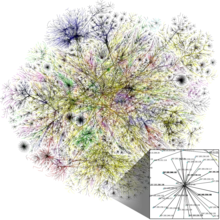Cyber sovereignty
Cyber sovereignty is a phrase used in the field of Internet governance to describe governments' desire to exercise control over the Internet within their own borders, including political, economic, cultural and technological activities; that is, to extend the concept of sovereignty to include all aspects of the Internet. In his 2015 book Data and Goliath, American security expert Bruce Schneier says the cyber sovereignty movement, in countries such as Russia, China, France and Saudi Arabia, was given an enormous boost by the 2013 revelations of widespread international NSA surveillance, which those countries pointed to as justification for their activities and evidence of U.S. hypocrisy on Internet freedom issues.[1]
| Internet |
|---|
 |
|
|
France
Project Andromède launched in 2009, with the aim to spend €285 million on "cloud souverain" or sovereign cloud.[2][3] The government spent €75 million on each of its two national champions, Cloudwatt and Numergy, but these two sold only €8 million worth of services, combined.[4] In January 1, 2020, all services were terminated and clients were advised their data was deleted.[5]
See also
- Cyber-utopianism, with contrasting ideals
- Network sovereignty
References
- Schneier, Bruce (2015). Data and Goliath: The Hidden Battles to Collect Your Data and Control Your World. New York: W.W. Norton & Company. ISBN 978-0393244816.
- https://web.archive.org/web/20111023154428/https://www.lemondeinformatique.fr/actualites/lire-285-millions-d-euros-pour-andromede-le-cloud-souverain-francais-41990.html
- "France continues to pursue its own data centre infrastructure, dubbed “le cloud souverain”, despite the closure of some of the businesses initially behind the idea." https://theconversation.com/digital-colonialism-why-some-countries-want-to-take-control-of-their-peoples-data-from-big-tech-123048
- "Numergy and Cloudwatt, each benefited from €75 million ($101 million) from the French government." https://gigaom.com/2013/11/18/a-guide-to-the-french-national-clouds/
- https://www.rudebaguette.com/2019/08/cloudwatt-orange-cloud-souverain-fin/
